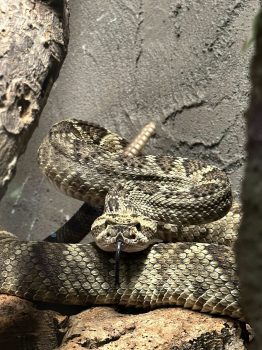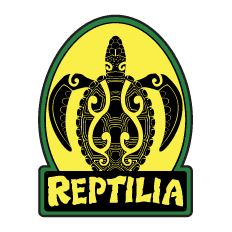Mojave Rattlesnake
Common Name: Mojave Rattlesnake
Scientific Name: Crotalus scutulatus
Names: N/A
Locations: Vaughan

Diet
The Mojave Rattlesnake is carnivorous, primarily feeding on small mammals such as rodents, rabbits, and occasionally lizards and birds.
Average lifespan
In the wild, Mojave Rattlesnakes typically live around 10 to 15 years.
Size
Mojave Rattlesnakes usually reach lengths of 90 to 120 centimeters (3 to 4 feet), although some individuals may grow larger.
Weight
Adult Mojave Rattlesnakes can weigh between 1 to 1.5 kilograms (2.2 to 3.3 pounds), depending on their size and age.
About
The Mojave Rattlesnake is native to the southwestern United States and parts of Mexico. It is most commonly found in desert environments, but it can also inhabit scrublands and grasslands. It is well-known for being one of the most venomous rattlesnake species due to the potent combination of hemotoxic and neurotoxic components in its venom.
Size and behavior
Mojave Rattlesnakes have a stout body with a triangular-shaped head and a rattle at the end of their tails. They are primarily nocturnal and crepuscular, meaning they are most active during the night and at dusk. They are ambush predators, using their heat-sensing pits to detect and strike at warm-blooded prey. When threatened, they will coil, raise their head, and use their rattle as a warning signal.
Diet and nutrition
Mojave Rattlesnakes primarily feed on small mammals, which they subdue with a quick venomous bite. Their potent venom immobilizes the prey, allowing the snake to swallow it whole. The rattlesnake’s digestive system then processes the meal over several days.
Conservation status
The Mojave Rattlesnake is currently listed as a species of Least Concern by the International Union for Conservation of Nature (IUCN). However, like many snakes, they face threats from habitat loss, road mortality, and human persecution.
Fun fact
The Mojave Rattlesnake is known for its unique and powerful venom, which contains both neurotoxic and hemotoxic properties. This combination can affect both the nervous system and the blood, making it particularly dangerous. Despite its reputation, the Mojave Rattlesnake plays an important ecological role in controlling rodent populations, helping to maintain balance in its desert habitat.
Call or visit your local Reptilia Facility to learn how you can adopt one of these amazing reptiles.










